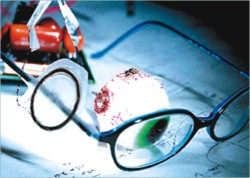SCI-ZONE
By
Dr. Freak
Toronto
Gets Cooled By Lake Ontario
Ir cooled by the frigid waters deep in Lake Ontario started bringing
relief to buildings in downtown Toronto after the valves were symbolically
opened on the multi-million-dollar project. The project, which is
believed to be the first of its kind in North America, could be cooling
significant parts of the downtown by the time the heat and humidity
hits Toronto next summer. Enwave, co-owned by the City of Toronto
and the Ontario Municipal Employees Retirement System, will draw cold
water from far out in the lake, using three intake pipes 83 meters
below the surface to collect fluid that is barely above freezing.
Brought to the John St. Pumping Station, the lake water is used to
cool down other water that will then be used to lower the temperature
in downtown buildings. The original water continues on into the city
system, is treated and enters the drinking supply. Compared to traditional
air-conditioning, Deep Lake Water Cooling reduces electricity use
by 75 per cent and will eliminate 40,000 tons of carbon dioxide, the
equivalent of taking 8,000 cars off of the streets of Toronto. The
company says that they have the capacity to air condition 100 office
buildings or 8,000 homes the equivalent of 32 million square feet
of building space.
Digital
Camera Gets Disposable
In our country, one-time-use inexpensive cameras aren't usual. But
in other countries, people who don't like to spend some bucks for
cameras buy those disposable cameras for occasional photography purposes.
And now, in USA, they have got another step ahead and guess what,
disposable digital cameras are out in the market by Pure Digital Technologies.
Pure Digital is a $19.99 2.0 mega pixel digital camera, with a colour
preview screen and the ability to delete pictures. After you bring
it in for processing, you get a free picture CD along with your prints.
This is quite a bargain for a digital camera. Moreover, its reusable,
so after its disposed, the manufacturer recycles, refurbishes and
repackages the camera.
Epson
Introduces Flying Robots
Epson has developed a very small (8.6g without battery) flying device,
something like a bluetooth-controled palm-top helicopter. Epson made
the robot light-weight by developing the world's smallest and lightest
gyro-sensor. Also helping to shed weight is the high-density mounting
technology used to package the micro-robot's two microcontrollers
including the Epson-original S1C33-family 32-bit RISC processor. To
top it off, Epson added an image sensor unit that can capture and
transmit aerial images via a Bluetooth wireless connection to a monitor
on land, and they also devised two LED lamps that can be controlled
as a means of signalling. Since it can carry 5 grams for only 3 minutes,
I can't imagine much practical use, but it's still neat. Epson says
that the key concept behind the efforts is "to expand the horizons
of micro-robot activities from two-dimensional space to three-dimensional
space" (whatever that means).
 Scientists
Create Artificial Retina
Scientists
Create Artificial Retina
Restoring sight to the blind is a Biblical miracle, a sign of divine
powers. Now it is being tested at the Boston Retinal Implant Project
by neuroophthalmologist Joseph Rizzo III and MIT electrical engineer
John Wyatt Jr., with very limited success. These scientists have planned
of a retinal prosthesis an implant that would take a wireless signal
from a video camera, bypass the light receptors of the retina, and
stimulate the healthy nerve cells directly to feed the image to the
brain. They only have fifteen electrodes implanted, but it's a start.
By 2006 they hope that a permanent prosthesis will be possible. Their
research is quite a breakthrough in this field and this will definitely
bring hope to the blind people. Will artificial eyes and retinal replacements
someday be as good as good human eyes?
Send in your views,
comments, suggestions, hate-mails about Sci-Zone at: <[email protected]>
